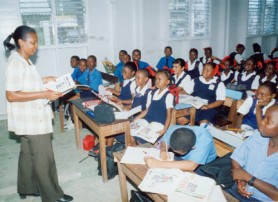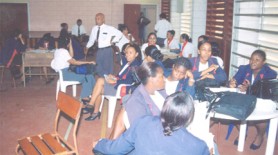In an extensive interview with Guyana Review editor Arnon Adams published in the May 2010 issue of the newspaper, Education Minister Shaik Baksh alluded to an initiative being undertaken by the Ministry of Education which appears designed to upgrade the end-qualification of trained teachers through the reconfiguration of the traditional three-year Trained Teachers’ Certificate being offered by the Cyril Potter College of Education. Graduates of the College will, as of the forthcoming academic year, be awarded an Associate Teaching Degree after which a period of further studies at the University of Guyana will secure them a Bachelor of Arts degree.

The initiative to improve teacher education is premised, one assumes on the assumption that the current level of training being provided by the CPCE is not adequate to meet the challenges of improving the quality of education in Guyana. That, in general terms is true but it is by no means the whole story. The inadequacies of our trained teachers is due in large measure to the failure of government to recognize the impact that poor pay and a lack of other real incentives has on frightening off young people seeking to pursue a worthwhile career. There is a sort of ‘hex’ on the teaching profession in Guyana. It is considered an altogether noble omission, maligned by the curse of poor conditions of service and no matter what we try to do to improve the quality of teachers in the service. As long as we must lower the qualification level for entry into the CPCE in order to take account of the fact that no one with really good results at the CXC wants to teach we will be on a hiding to nowhere.
We have learnt from the Education Minister that come September the entry requirements for CPCE will go up again. That will not cut it. Who wants an Associate Degree in Education if that qualification is not worth more pay, considerably more pay and better conditions of work.
The truth of the matter is that in large measure, our education system has simply not worked. True, we have made some measure of progress in terms of access to education and our students still manage to hold their own at the regional CXC examination. The fact of the matter is, however, that the quality of our education is low. “Most children start school at the appropriate age, enrolment levels at primary school are high and the completion rate is nearly 100 per cent but poor mastery of numeracy and literacy is widespread and student performance in national and regional examinations is low. In 2008 only 28 per cent of the students that presented for the Caribbean Secondary Education Certificate (CSEC) obtained pass rates in English and only 31 per cent did so in mathematics. An Early Grade Reading Assessment (EGRA) piloted in Guyana during the 2008-2009 school year targeted students in grades 2 to 4. It revealed that students know almost all of their letters but not the sounds that letters make, an essential step to learning how to read. In a full sample of 2,700 children tested in grades 2 to 4, over 60 per cent could not read a single word in the first line of a simple paragraph.” These are remarkable revelations contained in a document that has to do with the Improving Teacher Education project.

While the same document asserts that “low quality of education is largely the result of poor teaching, the exaggerated teacher bashing that emanates from the Ministry of Education often obscures some real and critical issues. I submit, for example, that the popular perception is that teaching is hard work, that it is thankless, that the public esteem in which teachers were once held has eroded, that teacher/student relationships have changed for the worse, that teachers live in fear of some parents and that no one, including the powers that be, care for teachers or about their welfare.
These are all compelling reasons why teaching has become virtually a profession of last resort – though it is undoubtedly true that some people still see teaching as an important vocation – and why many people who attach themselves to teaching never really trouble themselves to become trained teachers. In 2007 42 per cent of nursery, primary and secondary school teachers remained untrained. While this has been identified as a primary contributor to poor student performance what it also points to is ambivalence among many teachers regarding whether or not they wish to make teaching a career.
What we generally fail to do is to look at the quality of training that is offered for teachers in Guyana. For a start teacher training in Guyana takes longer than anywhere else in the region. The present model, the aforementioned document says, has proven to be “highly inefficient.” Currently, it takes seven years of training – three at CPCE and four at the University of Guyana, to earn to degree which is at least a few years longer than anywhere else in the region. But that is not the only problem. Even the Ministry of Education now appears prepared to admit that the quality of teacher training is low and that it has become the devil’s own job to fill the vacancies that exist at both the CPCE and UG. Up to a few years ago no more than four of the 31 lecturers at CPCE held Master’s degrees. While qualification levels at the UG are generally much higher, teaching methods at both institutions have been criticized as being “teacher-centred” and, moreover, that those methods “do not include creative methods of teaching or encourage student teachers’ independent thinking. What is also widely believed is that while CPCE tutors have more than fifteen years experience in teaching they do not necessarily have the right qualifications or skills mix to be effective as teacher educators.




